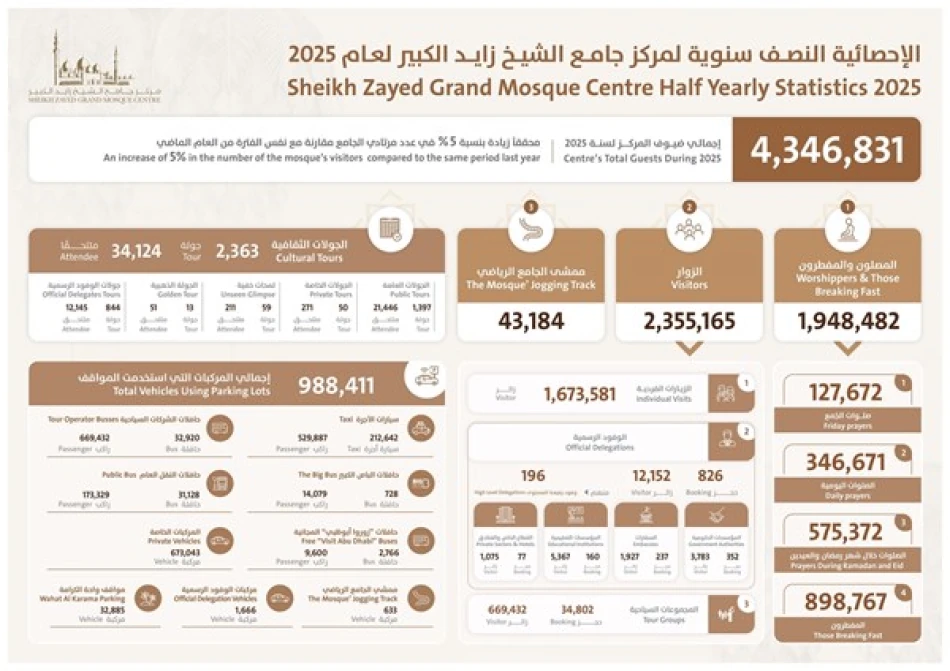
Iconic Sheikh Zayed Grand Mosque Welcomes 4.3 Million Visitors in First Half of 2023
Sheikh Zayed Grand Mosque Emerges as Global Cultural Powerhouse with 4.3 Million Visitors
Abu Dhabi's Sheikh Zayed Grand Mosque has cemented its status as one of the world's premier religious and cultural destinations, welcoming over 4.3 million visitors in the first half of 2025—a 5% increase from the previous year. With 82% of visitors arriving from outside the UAE, the mosque has evolved beyond a place of worship into a sophisticated cultural hub that operates around the clock, positioning Abu Dhabi as a major player in global religious tourism.
Record-Breaking Numbers Signal Tourism Recovery and Growth
The mosque's impressive visitor statistics reveal a diversified appeal that extends far beyond traditional religious pilgrimage. Of the 4,346,831 total guests, nearly 2 million were worshippers and those breaking their fast, while 2.35 million came as cultural tourists from various nationalities. An additional 43,184 people used the mosque's sports walkway, highlighting its role as a community facility.
The facility achieved a historic milestone during Ramadan 2025, recording its highest-ever single-night attendance of 72,710 worshippers on the 27th night of Ramadan (March 25, 2025). This figure underscores the mosque's growing significance in the Islamic world, particularly during major religious observances.
Asia Leads International Visitor Demographics
The visitor breakdown reveals fascinating insights into global travel patterns and the UAE's positioning as a cultural bridge between East and West. Asian visitors dominated at 49% of international guests, followed by Europeans at 35%, and North Americans at 10%. This distribution reflects the UAE's strategic location and its growing appeal among Asian tourists, particularly from India (20% of all visitors) and China (9%).
Russia's strong showing at 8% of visitors demonstrates the UAE's success in maintaining cultural diplomacy and tourism ties across diverse geopolitical landscapes. The presence of visitors from over 190 countries positions the mosque as arguably one of the most internationally visited religious sites globally.
Ramadan Hospitality Program Showcases Soft Power Strategy
The mosque's "Our Fasting Guests" initiative distributed an extraordinary 2.6 million meals during Ramadan, with nearly 900,000 served at the main mosque site. This massive humanitarian effort, executed in partnership with the Zayed Humanitarian Legacy Foundation and Erth Hotel, extends the UAE's soft power influence while demonstrating practical Islamic values of hospitality and charity.
The program's scope—reaching labor cities across Abu Dhabi and extending to the Sheikh Khalifa bin Zayed Grand Mosque in Al Ain—illustrates how religious tourism can drive broader social impact and community engagement initiatives.
High-Profile Diplomatic Visits Reinforce Global Status
The mosque's role as a diplomatic venue has intensified, hosting 826 official delegations including six heads of state, six prime ministers, and four parliamentary speakers. This level of high-profile engagement positions the mosque not merely as a tourist attraction but as a crucial soft diplomacy asset for the UAE.
Such diplomatic traffic reflects the UAE's broader strategy of using cultural and religious sites to facilitate international relations and showcase the country's moderate Islamic values to global leaders.
Innovation Meets Tradition in Visitor Experience
The mosque's operational sophistication sets new standards for religious tourism management. Its 24/7 accessibility through the "Sura" night tours specifically targets transit passengers and time-constrained visitors—a clever adaptation to Abu Dhabi's role as a global aviation hub.
The facility's technological integration includes multimedia guides in 14 languages, sign language tours for deaf visitors, and specialized children's programs. Over 70 electric vehicles transport visitors from parking areas, while 3,515 comfortable seats and 50 wheelchairs ensure accessibility for elderly and disabled guests.
Economic Impact and Future Implications
With nearly one million vehicles using the mosque's parking facilities, the economic ripple effects extend throughout Abu Dhabi's hospitality, retail, and transportation sectors. The integrated "Mosque Souk" and sports walkway create additional revenue streams while extending visitor dwell time.
This model of comprehensive religious tourism—combining worship, culture, dining, shopping, and recreation—offers a blueprint for other destinations seeking to maximize the economic potential of religious heritage sites. As global religious tourism recovers post-pandemic, the Sheikh Zayed Grand Mosque's performance suggests that destinations offering authentic cultural experiences alongside modern amenities will capture the largest market share.
The mosque's success also reinforces Abu Dhabi's positioning as a moderate, inclusive Islamic destination that can attract both religious and secular tourists—a increasingly valuable niche in global tourism markets.
Most Viewed News

 Layla Al Mansoori
Layla Al Mansoori






